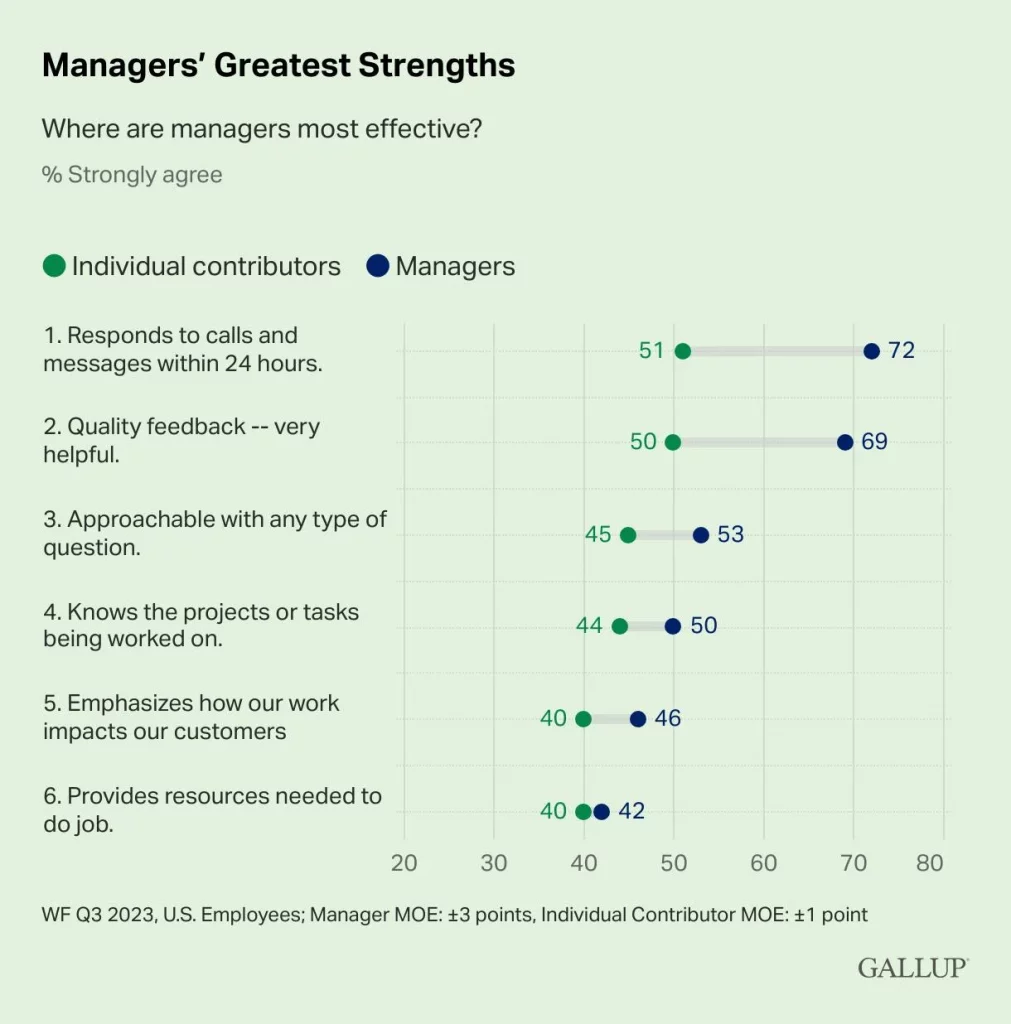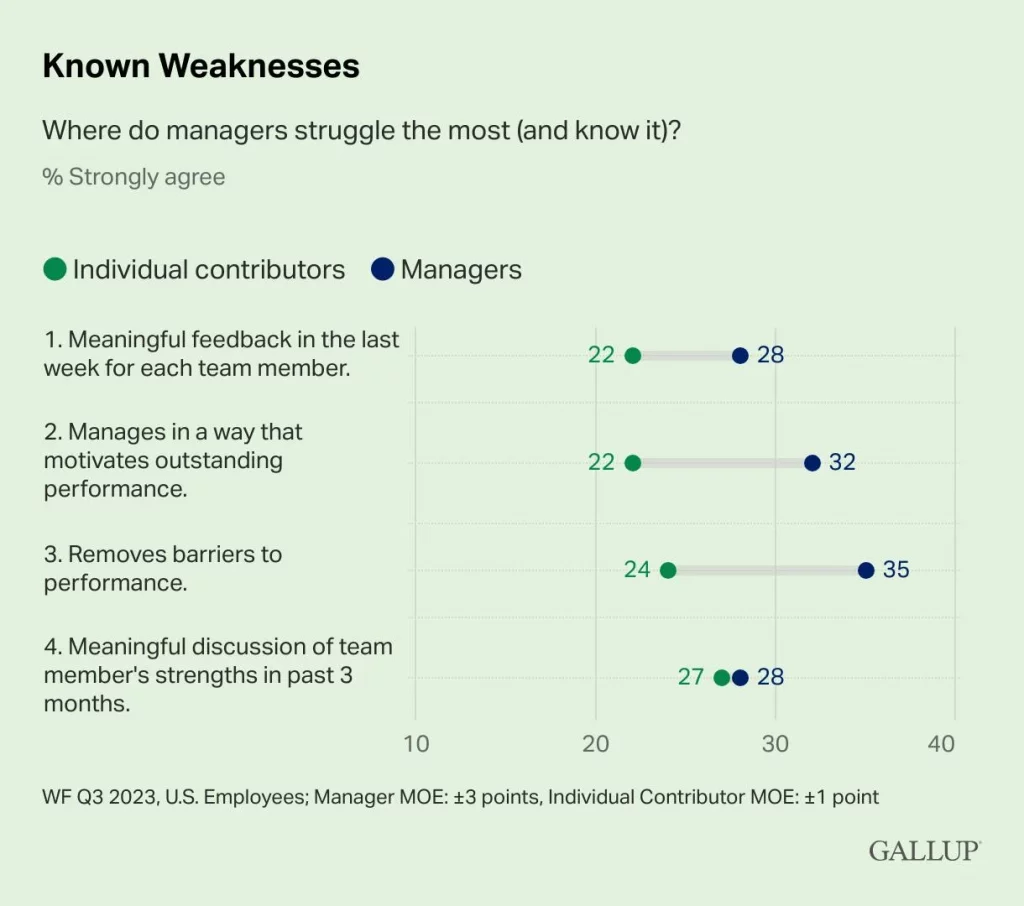Ever make a BIG mistake and immediately regret it? A friend tweeted today that a founder he had passed on investing in asked for feedback only tell him to "f--- off" on the feedback call.
Don't do that. 🤦♂️
Feedback is a gift, even if it isn't always delivered in the nicest packaging.
In today's edition, we show a counter example to that sort of reaction by of all people, Steve Jobs. We also look at the gap between what managers and their employees think, talk about how to build your EQ, and more.
And with that out of the way, let's dive in...
Table of contents:
- 🥘 Food for Thought on Handling Hostile People When They're Right
- 📰 News & Reports for Managers on Manager Perception vs. Team Member Realities
- 🗣️ Ask Lighthouse on Developing Your EQ...as an Introvert
➡️ Did a friend forward this to you? Get every issue straight to your inbox by signing up here.
Note: This is a preview of our weekly leadership newsletter, Lighthouse Leadership Weekly (LLW).
To get this sent to your inbox every week, along with our latest long form essays on this blog, you can sign up here.
🥘 Food for Thought
"One of the hardest things when you're trying to affect change is that people like this gentleman are right in some areas." - Steve Jobs responding to a hostile audience question at WWDC in 1997.
You've probably noticed we've used a lot of Steve Jobs examples lately. That's because I want to destroy the myth that he was nothing but an jerk and a tyrant.
Yes, his early years he was immature, difficult to work with, and ultimately disruptive enough to Apple that he deserved to be fired.
Yet, he then learned and grew *a lot*.
Apple thrived when he returned not simply due to his product genius, but because of the many great leadership skills he had developed and started putting into practice.
This week's Food for Thought is another such example:
Apple lost $1 billion in 1997.
— Jon Erlichman (@JonErlichman) June 10, 2024
Steve Jobs returned to the company and spoke to developers at WWDC.
When an attendee insulted him, he said:
“One of the hardest things when you’re trying to effect change is that people like this gentleman are right.”pic.twitter.com/XT5Daphshh
One of the hardest things to do as a leader is to take the ego hit of someone calling out a way you, your team, or company is wrong.
And what makes it even harder is when they do it in a not so nice way.
What you see here in how Steve handles it is a great leadership lesson.
Here's a quick transcript:
"One of the hardest things when you're trying to affect change is that people like this gentleman are right in some areas.
...The hardest thing is how does that fit in to a cohesive, larger vision that's going to allow you to sell $8 billion, $10 billion a product a year? And one of the things I've always found is that you've got to start with the customer experience and work backwards to the technology.
You can't start with the technology and try to figure out where you're going to try to sell it.
And I've made this mistake probably more than anybody else in this room. And I've got the scar tissue to prove it.
...as we have tried to come up with a strategy and a vision for Apple, it started with what incredible benefits can we give to the customer? Where can we take the customer?
Not starting with let's sit down with the engineers and figure out what awesome technology we have and then how are we going to market that. And I think that's the right path to take."
As a product manager by trade, there's a lot to love in this quote. Focusing on the customer is definitely the path to building great products that win markets.
However, the more important lesson for today is this: Be gracious, patient, and clear when changing your culture.

Gracious, Patient, and Clear.
Steve starts his response literally holding his stool like a shield to defend himself from the attack. It was a moment of humor while he faced some harsh (and likely valid) criticism.
He could have easily belittled, criticized, or ignored the attendee, but instead he used it as a moment to win people over.
Let's look at each aspect:
Gracious:
The first thing Steve did was admit the attendee was right. With how harsh the guy was, he didn't have to, but it immediately took the tension out of the room when he said, "One of the hardest things when you're trying to affect change is that people like this gentleman are right in some areas."
He then reinforced it when he later said, "And I've made this mistake probably more than anybody else in this room. And I've got the scar tissue to prove it."
Patient:
Culture change is hard. Even if you have a clear picture of everything that needs to change, it won't happen over night. And the larger your organization, the longer it will take to happen.
At the size Apple was at the time, and the problems that Jobs inherited, it was always going to take awhile to change and improve everything. Steve's answer shows how he had a patient understanding of the undertaking he was facing.
Clear:
Being clear about your plans to change your culture is very important. Your people need to understand the vision of where you're heading as an alternative to the current way of doing things that is broken.
Jobs does a masterful job of painting that picture with the remainder of his answer. He explains how they make decisions and what they aspire to.
When you combine this with the graciousness of his answer, he successfully wins over the crowd and masterfully handles the challenging question.
Can you accept harsh feedback?
The skill that Jobs demonstrates is an advanced one. Your ego, emotions, and subconscious can make it extremely difficult to hear the feedback amidst the attack and sharp words of such a message.
Yet, being willing to listen and hear the kernel of truth within tough comments is the kind of skill that can take your leadership to a whole new level; it frees you to hear feedback in all its form, so you can take away the valuable parts even if there's sharpness around it.
And this applies well beyond hostile crowds at public events.
As the former CFO of Shopify suggests, another place to *seek out* this kind of feedback is with new hires:
Ask your new hire to tell you everything that is wrong with your company.
— Mark MacLeod (@markmacleod_) April 29, 2024
They will only ever have fresh, outside eyes at the start.
Next time you hire someone, get them to rip your company to shreds.
You will learn a lot.
As MacLeod explains, you will learn a ton in doing so.
Do you have the courage to listen to even harshly delivered feedback?
📰 News & Reports for Managers
📌 What managers think vs. their teams varies depending on the skill set
I came across some new data from Gallup that shows there is a real gap between what managers think they're good at and what employees (ICs) think:

As you can see, managers have quite a big gap in what they think vs. their team in two key areas:
- Responsiveness: 21% more managers think they're responding quickly than employees.
- Quality feedback. By a similar rate, 19% more managers think they give quality feedback compared to the % of employees that agree.
It's also noticeable that managers overestimate their abilities in all of the other areas listed in the table when compared to how their team actually perceives it. There is a lesson in there for all of us to think about our perception vs. the reality of others around us. What do you think you're good at that your team would disagree?
Fortunately, it's not all bad news. Managers are also harder on themselves in other ways:

As you can see, employees and managers tend to agree that managers are not very good at:
- Giving *frequent* meaningful feedback
- Motivating strong performance
- Removing blockers for their team
- Talking about the strengths of your team recently
To be honest, I'm not really surprised by this list.
These are exactly the things we teach in our Lighthouse Lessons courses, and frequent topics here and on our blog. And it's exactly what every leader is typically trying to get better at.
Yet, the ironic thing is that all these weak areas for managers are exactly what makes managers great. As Gallup puts it, "These known weaknesses are very highly correlated with employee engagement, demonstrating that managers are not only falling short, but these behaviors are among the most critical to increasing productivity, retention and customer engagement."
This week, it's worth reflecting:
- How are you doing in these areas?
- How do you think your team would say you're doing in these areas?
- What can you do this week to improve in one of those areas?
🗣️ Ask Lighthouse on Developing Your EQ?
A simple but important question came across Twitter, and I wanted to explore it further here:
"How do I develop my EQ as an introvert?"
EQ is an important skill no matter whether you're an introvert or extrovert, but can present some different challenges if you are introverted.
Let's take a closer look through the lens of introverts:
1) Remember the 5 aspects of EQ
We have a great, detailed post on building your EQ, which breaks down EQ into 5 aspects:
- Self-awareness: being able to recognize your own emotions and understand your tendencies and triggers.
- The Lesson for Introverts: Use your reflective nature as an introvert to boost your self-awareness. Reflect on how various experiences go and adjust your actions and reactions.
- Self-regulation — managing your emotional responses by controlling your reactions and impulses.
- The Lesson for Introverts: The fact that introverts tend to process emotions later and have fewer reactions in the moment makes this easier than it is for extroverts.
- Motivation — being aware of what motivates you and others.
- The Lesson for Introverts: This is a skill to learn. Use your new skill of self-awareness to pay better attention to what makes you feel really motivated and seems to energize others.
- Empathy — recognizing how others are feeling in order to relate to them more effectively.
- The Lesson for Introverts: Again, build on your self-awareness skills to recognize the emotions of others and how your actions (good or bad) make people feel.
- Social skills — Managing relationships and building rapport with others.
- The Lesson for Introverts: If you tend to be a bit more shy, this can be more challenging, but there are ways to work around it. More on this in the next point...
2) Develop the skill of asking good questions.
If you're an introvert who doesn't particularly like the spotlight nor being the center of attention in a group, this is the ultimate social hack to develop.
The best way to not be the person getting put on the spot with a series of questions is to instead be interested in other people and ask them questions.
If you show genuine interest in others and ask them good questions (and follow up ?s), very rarely will you have to say much else. Best of all, the talker will think you’re a great person.
Dale Carnegie talks about this in his classic, "How to Win Friends and Influence People" (which will also raise your EQ). In the book, he spends an evening at a dinner party talking about an obscure topic with a guest. He knew nothing about the topic but was an eager, curious listener, which allowed the guest to happily share their knowledge and experience.
At the end of the night, the guest told the host that Carnegie was a wonderful conversationalist.
Find other people interesting, ask them questions, and you'll be able to do the same.
3) Do your homework when meeting with others
When you're heading into a social situation where you want to work on your EQ, preparation is your friend.
If you know who else is attending the event or meeting, and you don't already know a lot about them, spend a few minutes researching key people.
This can empower you a few ways:
- You'll know who you want to prioritize talking to.
- You'll have ideas of things to ask them about.
- You can find someone and a subject you would be excited to hear more about.
We all have topics we have no interest in. I don't care about the latest TV show drama, sports gambling, fantasy sports, celebrity gossip, or the finer points of the latest outrage/engagement bait.
Yet, there are other things I am endlessly curious about.
I love hearing about people's passion projects, and about healthy hobbies I know nothing about.
So I focus my questions when getting to know people on what I care about.
You can't fake interest, so use preparation to feel more confident, and help you know what to ask others about.
Need to work on your EQ? We have 3 great posts to help you:
- Learn how to be more mindful and reflective at work (a get step in building your EQ)
- Learn how to improve your EQ
- Learn more about EQ specifically as it relates to leading others here
Sign up to get this newsletter & our latest blog posts straight to your inbox




